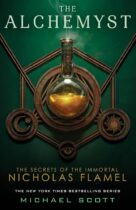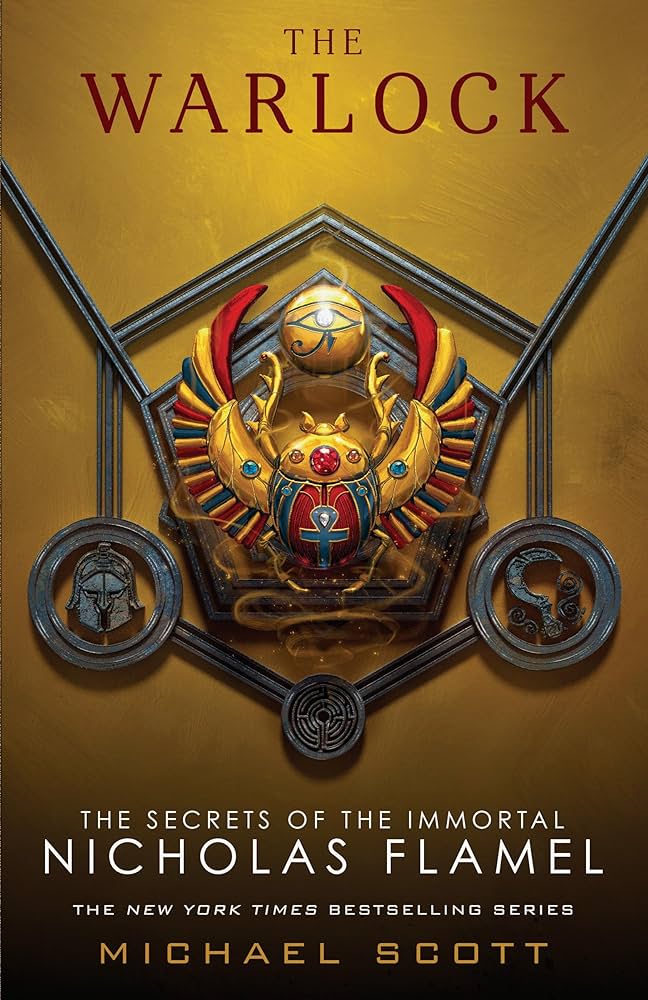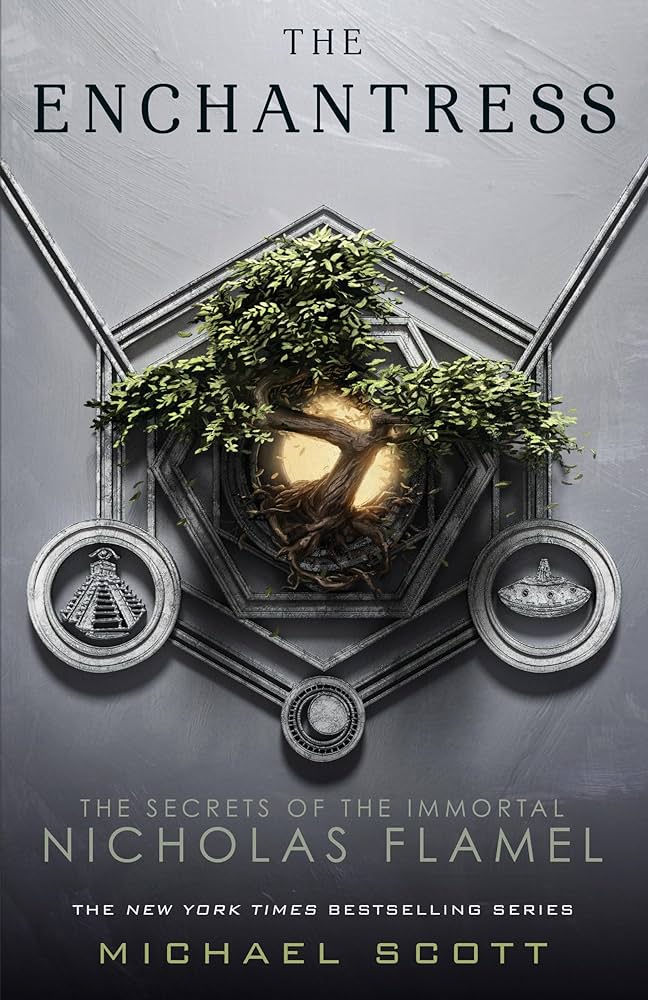Book Spotlight: The Alchemyst (Secrets of the Immortal Nicholas Flamel, Book 1) by Michael Scott

Book Spotlight: The Alchemyst (Secrets of the Immortal Nicholas Flamel, Book 1) by Michael Scott
GOOD Evening, Beardies,
Back in May, we did an Author Spotlight and giveaway with Michael Scott, author of the Secrets of the Immortal Nicholas Flamel Series. The contest, and his subsequent interview, were very successful, so it didn’t take us long to decide to do a collaborative series of Book Spotlights featuring each of the Flamel books. Unfortunately, finding time to collaboratively write the posts took much longer, but we finally did, and we couldn’t be more excited to bring you the first in this series of Book Spotlights.
{—PREMISE—}
FAMOUS alchemist Nicholas Flamel died in 1418—at least that’s what the records say. There’s only one problem: his tomb lies empty, a suspicious coincidence for someone who supposedly discovered the secrets of immortality.
While their parents are on an archaeology dig in Utah, twins Josh and Sophie Newman are forced to stay in San Francisco with their Aunt Agnes for the summer. Both quickly find jobs in order to save up money for a car. Josh’s boss, Nick Fleming, seems like a great person, but a strange turn of events reveals that “Nick Fleming” isn’t who he seems, and Josh and Sophie find themselves on a journey in which they discover that they may have legendary powers of their own.
{—GEMS FOR WRITERS—}
1. MYTHOLOGY...
AS we were reading this book, we were astounded by how many of the world’s mythologies were seamlessly united in the story, but in his interview, Mr. Scott enlightened us about his inspiration for this:
"The original idea was to create a series that unified all the world's mythology, based on the simple premise that at the heart of every story is a grain of truth. As I research folklore all over the world, it has become clear to me that so many of the world's myths and legends are incredibly similar, and some are almost identical. So I came up with the idea that I would feature as many of the world's folklore and myths in one story, and populate my world with immortal human characters. The only created characters in the series are Sophie and Josh."
THE premise of a unified world of mythology, wherein the truths of one legend are retold in each of the others, is masterfully set in The Alchemyst. We are intrigued by this premise, eager to continue our joined efforts, and curious what Mr. Scott has in store with the other five books of the series.
2. USE OF HISTORICAL FIGURES...
MICHAEL SCOTT seamlessly weaves many real historical figures into his story, and manages to preserve their integrity while using them in creative, yet believable ways. This blurs the line between fantasy and reality, making it even easier for the reader to slip into the fictional world. It would take ages to list the whole cast of historical characters in this book, but here are a few:
- Nicholas Flamel (1330-1418) worked as a bookseller and scrivener in Paris. After his death, he developed a reputation as an alchemist because of his work on the philosopher’s stone and his quest to understand an alchemical tome called The Book of Abramelin the Mage. Flamel’s wife, Perenelle (1320-1412) served as his assistant and became known as a sorceress and alchemist in her own right. The Flamels were known as great philanthropists in their lifetime and both have streets in Paris that bear their names. They were buried in Paris, but their grave is empty, paving the way for further speculation about their immortality—and for Michael Scott to set them down in a twenty-first century bookstore under the assumed names of Nick and Perry Fleming.
- Dr. John Dee (1527-1609) was a noted mathematician, occultist, astrologer, and served as an advisor to Queen Elizabeth I. He developed a plan for the British Navy, determined the coronation date of Elizabeth I through an astrological reading, was imprisoned for treason for reading the horoscopes of Elizabeth I and her sister Mary, and is rumored to have hexed the Spanish Armada. He is also said to have been the inspiration for the Shakespearean characters of Prospero and King Lear. He is the villain-in-chief of the Secrets of the Immortal Nicholas Flamel Series and has been chasing the Flamels for centuries. According to Scott, Dee’s relentless pursuit of the Flamels is to blame for many disasters, including the Great Fire of London in 1666.
- Mary Wollstonecraft Shelley (1797-1851) was the daughter of an anarchist and an acclaimed feminist. At the age of eighteen, she conceived the idea for her best-known novel, Frankenstein, on a dare while staying in a summer home in Switzerland with her husband, the poet Percy Bysshe Shelley, and her husband’s friend Lord Byron. The trio had been reading ghost stories and had a contest to see who could write the scariest story. In The Alchemyst, Shelley is said to have based her novel on a story she heard from Dr. John Dee.
3. WORLD BUILDING...
- Magic. Scott’s system of magic is one of the most unique we’ve encountered. His use of Auras is a blend of the existing belief that auras can be perceived as colors, and the introduction of his own creation—that they also have an aroma unique to their owner.
- Shadowrealms. In The Alchemyst, we are only privy to view one Shadowrealm—a separate dimension created by an Elder upon banishment from the Earthly realm—but we are told that there are many. By introducing us to Hekate‘s Shadowrealm, Scott is able to set aside his Earthly setting for one that doesn’t conform to its limitations. Within this Shadowrealm we are introduced to several fantastical creatures—both of legend or otherwise—and we are also reminded of Scott’s love affair with mythology with his inclusion of Yggdrasil.
- Landmarks. We know from reading other reviews that Mr. Scott uses several landmarks around the world within the Flamel series, but it’s his exceptional ability to describe said landmarks—such as Alcatraz—with great detail that blows our minds. Again, just thinking about the size of his research notes humbles us. Given the size of the research notes for our own respective writing endeavors, we can only imagine!
{—RATING—}
{—CONCLUSION—}
The Alchemyst pulled us in with its stellar world-building, creating a unique magical system and using real historical figures and pinpoint descriptions of real-world landmarks to make a solid, believable world. On top of being an exceptional writer, Mr. Scott was gracious enough to allow us to pick his brain about his inspirations and creative process in a fantastic interview. We are, and will continue to be, huge fans of Michael Scott and the Flamel series; stay tuned for our collaborative Spotlights on the next five books.
***The Alchemyst (2007) by Michael Scott is published by and copyright Delacorte Press, an imprint of Random House Children’s Books.










